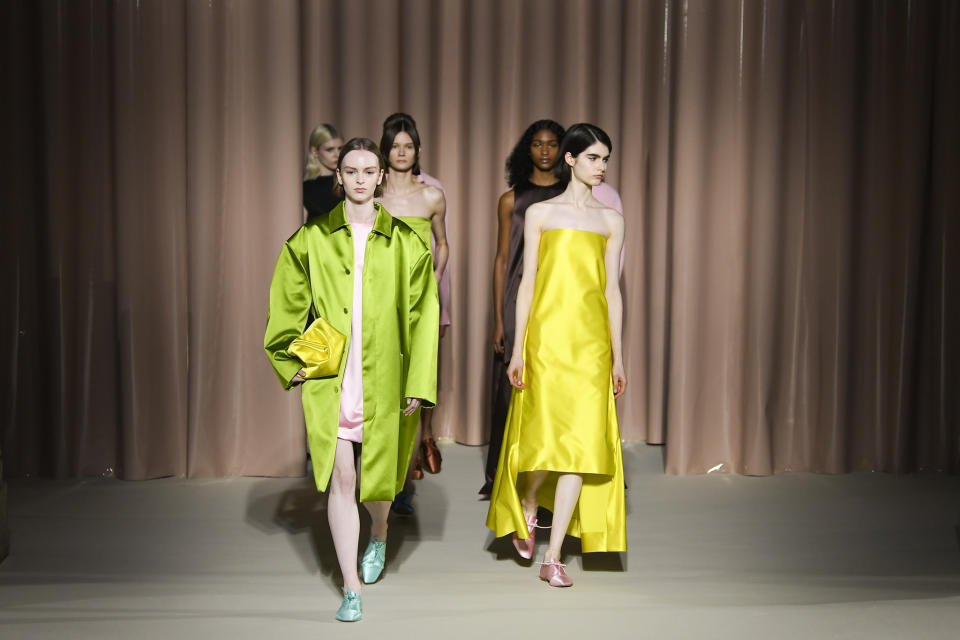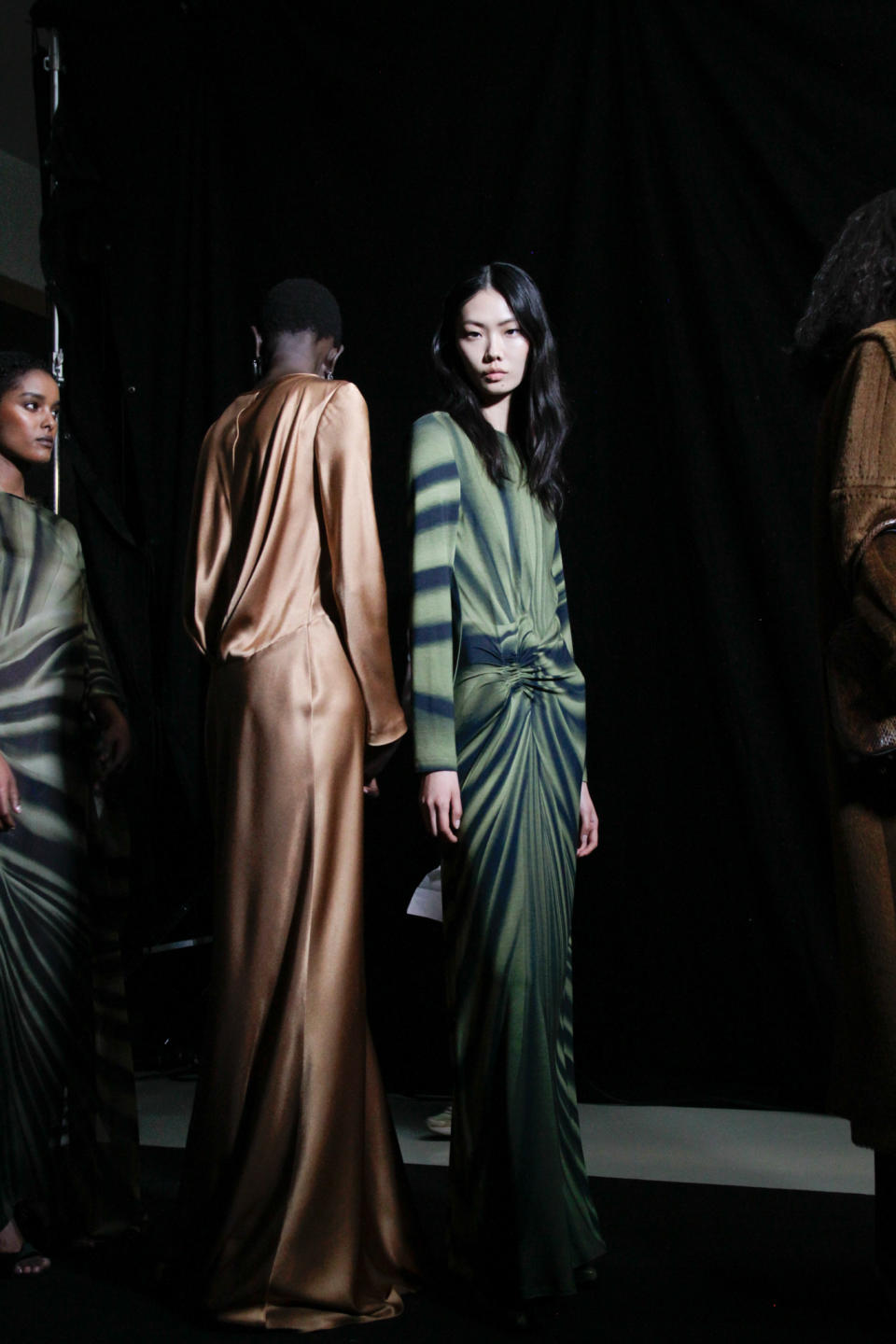Moschino Parent Aeffe Expects to See Effect of Reorganization in 2024

MILAN – The impact of a multilayered restructuring impacted Aeffe’s profitability and sales in 2023, a year that executive chairman Massimo Ferretti described as one of transition, which saw a “radical reorganization of the Moschino brand in terms of both creativity and distribution, and at the same time a transformation of [the group’s] internal structure through a series of corporate mergers and incorporations.”
Ferretti said that the results presented on Thursday were “expected but not positive” and “clearly the result of these transformations and the strong investments of recent years, which will bring positive effects as early as 2024.”
More from WWD
Philosophy di Lorenzo Serafini Inks New Childrenswear License With Monnalisa
Moschino's New Creative Director Is Former Loewe Designer Adrian Appiolaza
In the 12 months ended Dec. 31, Aeffe revenues fell 9.5 percent to 319 million euros, compared with 352 million euros in 2022.
Sales of the ready-to-wear division were down 8.4 percent to 212.4 million euros, and revenues of the footwear and leather goods division amounted to 142.1 million euros, registering a decrease of 13.1 percent.
Net loss widened to 32.1 million euros compared with a net loss of 9 million euros in 2022.
In addition to Moschino, Aeffe comprises the Alberta Ferretti, Philosophy di Lorenzo Serafini and Pollini brands.
The first collection designed for Moschino by its new creative director Adrian Appiolaza was presented in February during Milan Fashion Week and Ferretti said he was sure the designer “will best guide the brand in a new phase of growth. We are certainly operating in an unstable economic and political context at the moment, dealing with a challenging market; however, we look to the future with great positivity and optimism, leveraging on international brands offering unique creative and high-end quality.”
In 2023, adjusted earnings before interest, taxes, depreciation and amortization, net of the extraordinary effects associated to the organizational restructuring of the group and to extraordinary promotional events such as the 70th anniversary of Pollini and the 40th anniversary of Moschino, totaled 12.4 million euros compared with 35.6 million euros in 2022.
Operating loss amounted to 20.5 million euros compared with an operating profit of 1.2 million euros in 2022.
In an interview, chief financial officer Matteo Scarpellini said “three very important reorganizations” impacted the performance of the group last year. “We closed Moschino’s Love and Boutique collections, elevating the level and perception of Moschino Couture,” explained Scarpellini, also citing a renewed focus on Moschino Jeans, which are produced in-house, since last October. “For a brand such as Moschino, three quarters of a year without a creative director is especially meaningful,” he said, referring to the fact that Jeremy Scott’s last collection was for fall 2023, and his successor Davide Renne died unexpectedly last November.
Appiolaza was appointed in January as Moschino’s new creative director, and he brings to Moschino a decade of experience as women’s ready-to-wear design director at Loewe, working with creative director Jonathan Anderson. He previously held the same role at Chloé with Clare Waight Keller.
The other two key changes were the merger of six Aeffe branches in Italy, the U.K., France and the U.S., “a rationalization of the company and of the management that was completed in January,” and the reorganization of the group’s distribution to retail from wholesale.
He said the reception to Appiolaza’s collection was “incredible, very positive and the sales campaign is going very well. We expect a nice boost with the spring 2025 collection.”
Scarpellini revealed that Moschino is planning “a special event to present both pre-collections for men’s and women’s in Milan during fashion week.”
In 2023, Moschino sales fell 11.3 percent to 240.8 million euros, while Alberta Ferretti revenues grew 3.4 percent to 21.9 million euros. Philosophy di Lorenzo Serafini reported a growth of 8 percent in revenues to 17.5 million euros and Pollini registered a decrease of 6.3 percent to 34.5 milion euros.
“Philosophy has a new aesthetic vision, more mature,” said Scarpellini, who added that Neiman Marcus upgraded the brand from the contemporary floor to the luxury one.

Alberta Ferretti, he said, is recovering but has been dented by the wars, given that Russia and the Middle East were strong markets for the brand.
Margins contracted also due to the new strategic course of the Moschino brand with the associated costs connected to the change of distribution model in China, entirely to retail from wholesale.
Scarpellini said that he expects EBITDA to grow in the year, which he characterized as a “hybrid” one. “We see a slowdown in wholesale in 2024 and retail will be soft in the first half, but we expect a recovery in the second half. Break-even will be challenging since China is growing but not as we expected.”
In 2023, sales in Italy decreased 7.3 percent to 134 million euros, representing 42 percent of the total. The company reported a positive performance of the retail channel with an increase of 3 percent compared to the first nine months of 2022, while the wholesale channel saw a drop of 8 percent.
Sales in Europe were down 16.3 percent to 98.6 million euros, accounting for 31 percent of the total.
In Asia and the Rest of the World area, revenues rose 2 percent to 66.8 million euros while sales in America were down 21.3 percent to 19.3 million euros.
In 2023 the group recorded growth in the retail channel but that was not sufficient to offset the decrease in the wholesale channel, which represented 67.1 percent of the total. This channel recorded a decrease of 14 percent to 213.9 million euros. The retail channel was up 7.2 percent to 94.9 million euros. Royalties fell 33.7 percent to 9.9 million euros following the termination of some licenses for the Moschino brand.
As of Dec. 31, net debt net of the IFRS 16 effect stood at 152 million euros compared with 127 million at the end of December the previous year. Aeffe has over the last two years made two extraordinary strategic investments for a total of 90 million euros relating to taking full control of Moschino through the purchase of the 30 percent stake it did not already own and the change of distribution in China for the Moschino brand. As reported, in 2021 Aeffe took control of Moschino’s distribution in mainland China, signaling the increasing relevance of that market for the label. This involved around 20 stores, which had been operated for the previous 10 years by Scienward Fashion and Luxury (Shanghai) Co. Ltd.

Best of WWD


